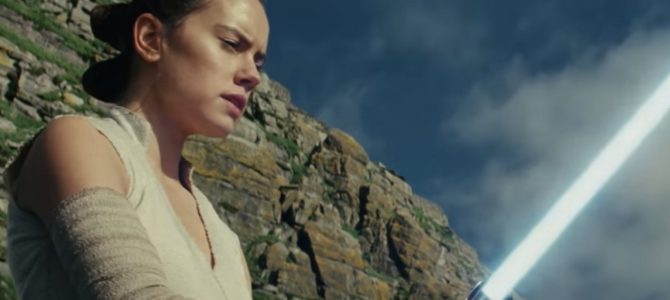
The appeal of Star Wars has always been its extraordinary heroes. When we first meet Ben Kenobi in “A New Hope,” we lean in and our arms prickle as he gazes into the past and murmurs, “Obi-Wan Kenobi. Now that’s a name I’ve not heard in a long time.”
Obi-Wan, we learn, was a member of the Jedi, mysterious, quasi-religious warriors who, “for over a thousand generations…were the guardians of peace and justice in the old Republic—before the dark times—before the Empire.”
In the space of a few seconds, we are swept into a grand story, an ancient tale filled with mythic heroes and a forgotten faith of which Obi-Wan appears to be the last vestige. We are captivated by reverence for a lost past we want to know more about, a past whose secrets will help Luke (and us) understand George Lucas’ strange and wonderful galaxy far, far away.
Contrast this with a pivotal scene in “The Last Jedi,” in which Luke and ghost Yoda burn down a gnarled tree that housed that last books of the Jedi library. “Page-turners they were not,” quips Yoda, who then chuckles as he watches the flames. Nobody, evidently, needs any of the wisdom in those books, or of the ancient religion they represent.
This kind of lighthearted immolation of the past permeates “The Last Jedi,” which may be best summed up as a cinematic act of demolition. The movie doesn’t just kill an absurd number of characters. It represents a rejection of “Star Wars’” core concept: that in a galaxy full of mind-and-planet-blowing machinery, there is a power older and greater than any technological terror—a power wielded and taught by certain extraordinary individuals whose moral choices can change the fate of the universe.
Chucking the Need to Learn Responsibility for Power
In previous “Star Wars” films, these extraordinary individuals underwent grueling training to achieve the knowledge necessary to control their Force abilities. The story focused on one family of extraordinary people, a family that produced heroes of messianic proportions, each of whom were tempted by evil and ultimately succumbed or resisted.
The fate of the galaxy was tangled up with the Skywalkers, and that thrilled audiences. It’s no accident that the most iconic moment in the saga is the revelation that the extraordinary villain is kin to the extraordinary hero-in-training. The Force runs in families.
Yet this family, while naturally gifted beyond others, still requires the wisdom and training of old masters who know more and have earned the right to teach. That’s because when extraordinary individuals go wrong, they go extraordinarily wrong. They become anti-messianic powers, cosmic forces of evil which only a gifted and well-taught hero can defeat.
But “The Last Jedi” chucks the idea of wise mentors down the garbage compacter. It democratizes the Force and denies not only that the current cast of characters includes special people, but that such people ever existed. In this movie’s telling, there never were any living legends. Consequently, the graying masters of both Dark and Light sides have nothing of value to teach their precocious pupils.
As the last remnants of the Jedi religion apparently go up in smoke, Yoda assures Luke that the movie’s least-trained Force-user already has everything she needs. We no longer feel that something precious (the Jedi religion) is on the brink of being lost. There is no longer any sense that the extraordinary people are nearing extinction, and that if they die, “their fire will have gone out of the universe.” The old guard now giggle as their inheritance is torched.
Nobody Is Any Better than Anybody Else
If the Jedi die out, says Luke, the galaxy will be no poorer for their absence. Gone are our arm-prickles at the discovery that one of the old masters might still be among the living. The authority figures in this movie are disillusioned and eaten up with ennui, and readily frightened or bested by their teenage understudies. Even these prodigies, we learn, aren’t necessarily special, or connected in any way with the grand family saga that came before.
“The Last Jedi” transforms Star Wars from a space-superhero story into one consumed with what C. S. Lewis calls the “I’m-as-good-as-you” spirit. It’s a spirit all too common in our time, when “equality” is the sole remaining virtue, and young people rally to topple statues of historical figures about whom they know next to nothing.
In director Rian Johnson’s telling, everyone can become proficient in the Force with near-zero training or discipline, and without the insights of teachers who know it better. Youthful impetuosity is rewarded instead of chastened.
The fresh-faced heroine turns out to be a better pilot than Han Solo, a better mechanic than Chewbacca, and a better force-user and swordsman than her trained nemesis. Students are no longer stepping into a tradition bigger than themselves, discovering something mysterious and ancient, or submitting to “over a thousand generations” of established authorities. Neophytes dominate their legendary masters on both sides of the Force. There are no more extraordinary people in this new “Star Wars,” because the powers of a Jedi knight have become ordinary.
But we watched Star Wars to see extraordinary people. If the Force requires no discipline to attain, if anybody can pick it up as a hobby, if learning it does not put one in touch with a deeper and nobler past, and if the people on screen are just like us, the prickles fade, and there’s no point in watching anymore.









